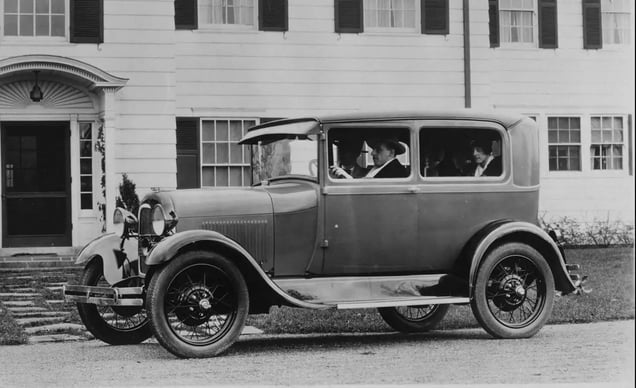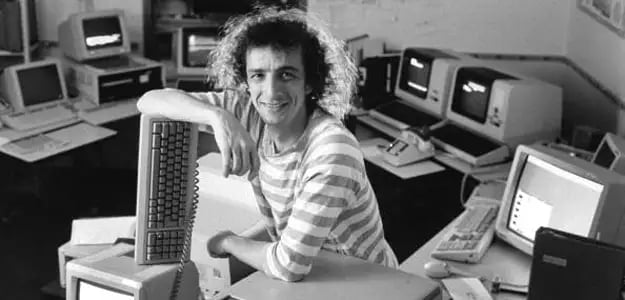Modern internet (the World Wide Web) turned 25-years-old this past week on December 20th.

And while most of us grew up with it (I see you AIM, I see you), it’s important to remember that at 25-years-old the internet is still in it’s infancy. Yes, it’s grown fast. We have access to almost every bit of information we’ll ever need and can video chat with virtually anyone on earth from every part of the world. But it’s still just a baby.
To put that in perspective, 25 years is same amount of time between when Ford started and when they released the Model A. Now, nearly 80 years later, we have self-driving cars that are more like computers than the what was produced back then.
In other words, there’s significant amount of innovation ahead… our little baby internet is like a car with a top speed of 60 MPH.

However, even though we’ve made it this far, when it was invented there was a handful of people who thought the internet was a fad like Beanie Babies or No Fear t-shirts.
And so, to celebrate our baby’s big 2-5, I’m sharing with you a Newsweek article from 1995 that was written by one of these naysayers.
Spoiler: The article’s author, Clifford Stoll, predicts that the internet will die after 1996.
At the time, Stoll was living in Silicon Valley as a technology author and columnist for Newsweek. In his article, Stoll claimed that the internet will never work because “hardware and software will all top out in the mid-90s and, thus, the Internet will never ever get any more user friendly or portable. Also, it is different and scary.”
Stoll, who still lives in Silicon Valley and has seen the outcome of his prediction, has since commented on his bold 1995 article:
“Of my many mistakes, flubs, and howlers, few have been as public as my 1995 howler. Wrong? Yep… Now, whenever I think I know what’s happening, I temper my thoughts: Might be wrong, Cliff…”

You can read the entire article along with his recent comments below, but here are my favorite lines:
On e-commerce. We’ll order airline tickets over the network, make restaurant reservations and negotiate sales contracts. Stores will become obsolete. So how come my local mall does more business in an afternoon than the entire Internet handles in a month?
On ebooks. How about electronic publishing? Try reading a book on disc. At best, it’s an unpleasant chore
On digital news. The truth is no online database will replace your daily newspaper
On crowdsourcing information (Wikipedia). Lacking editors, reviewers or critics, the Internet has become a wasteland of unfiltered data. You don’t know what to ignore
On the internet’s portability. And you can’t tote that laptop to the beach. Yet Nicholas Negroponte, director of the MIT Media Lab, predicts that we’ll soon buy books and newspapers straight over the Internet. Uh, sure.
Stroll is still around and well. Here’s his Wikipedia page if you want to look him up.
Below is the entire article:

Hype alert: Why cyberspace isn’t, and will never be, nirvana. (Newsweek, 1995)
After two decades online, I’m perplexed. It’s not that I haven’t had a gas of a good time on the Internet. I’ve met great people and even caught a hacker or two.But today, I’m uneasy about this most trendy and oversold community – the internet.
Visionaries see a future of telecommuting workers, interactive libraries and multimedia classrooms. They speak of electronic town meetings and virtual communities. Commerce and business will shift from offices and malls to networks and modems. And the freedom of digital networks will make government more democratic.
Baloney. Do our computer pundits lack all common sense? The truth is no online database will replace your daily newspaper, no CD-ROM can take the place of a competent teacher and no computer network will change the way government works.
Consider today’s online world. The Usenet, a worldwide bulletin board, allows anyone to post messages across the nation. Your word gets out, leapfrogging editors and publishers.
Every voice can be heard cheaply and instantly. The result? Every voice is heard. The cacophony more closely resembles citizens band radio, complete with handles, harassment, and anonymous threats. When most everyone shouts, few listen.
How about electronic publishing? Try reading a book on disc. At best, it’s an unpleasant chore: the myopic glow of a clunky computer replaces the friendly pages of a book.
And you can’t tote that laptop to the beach. Yet Nicholas Negroponte, director of the MIT Media Lab, predicts that we’ll soon buy books and newspapers straight over the Internet. Uh, sure.
What the Internet hucksters won’t tell you is that the Internet is one big ocean of unedited data, without any pretense of completeness. Lacking editors, reviewers or critics, the Internet has become a wasteland of unfiltered data. You don’t know what to ignore and what’s worth reading.
Logged onto the World Wide Web, I hunt for the date of the Battle of Trafalgar. Hundreds of files show up, and it takes 15 minutes to unravel them–one’s a biography written by an eighth grader, the second is a computer game that doesn’t work and the third is an image of a London monument.
None answers my question, and my search is periodically interrupted by messages like, “Too many connections, try again later.”
Won’t the Internet be useful in governing? Internet addicts clamor for government reports. But when Andy Spano ran for county executive in Westchester County, N.Y., he put every press release and position paper onto a bulletin board. In that affluent county, with plenty of computer companies, how many voters logged in? Fewer than 30. Not a good omen.
Then there are those pushing computers into schools. We’re told that multimedia will make schoolwork easy and fun. Students will happily learn from animated characters while taught by expertly tailored software.
Who needs teachers when you’ve got computer-aided education? Bah.
These expensive toys are difficult to use in classrooms and require extensive teacher training. Sure, kids love video games–but think of your own experience: can you recall even one educational filmstrip of decades past? I’ll bet you remember the two or three great teachers who made a difference in your life.
Then there’s cyberbusiness. We’re promised instant catalog shopping–just point and click for great deals. We’ll order airline tickets over the network, make restaurant reservations and negotiate sales contracts. Stores will become obsolete.
So how come my local mall does more business in an afternoon than the entire Internet handles in a month?
Even if there were a trustworthy way to send money over the Internet–which there isn’t–the network is missing a most essential ingredient of capitalism: salespeople.
What’s missing from this electronic wonderland? Human contact. Discount the fawning techno-burble about virtual communities. Computers and networks isolate us from one another. A network chat line is a limp substitute for meeting friends over coffee.
No interactive multimedia display comes close to the excitement of a live concert. And who’d prefer cybersex to the real thing?
While the Internet beckons brightly, seductively flashing an icon of knowledge-as-power, this nonplace lures us to surrender our time on earth. A poor substitute it is, this virtual reality where frustration is legion and where–in the holy names of Education and Progress–important aspects of human interactions are relentlessly devalued.
STOLL is the author of “Silicon Snake Oil–Second Thoughts on the Information Highway” to be published by Doubleday in April.
Years after his famous prediction, Stroll was a good sport about it and wrote to The Next Web.
Of my many mistakes, flubs, and howlers, few have been as public as my 1995 howler.
Wrong? Yep.
At the time, I was trying to speak against the tide of futuristic commentary on how The Internet Will Solve Our Problems.
Gives me pause. Most of my screwups have had limited publicity: Forgetting my lines in my 4th grade play. Misidentifying a Gilbert and Sullivan song while suddenly drafted to fill in as announcer on a classical radio station. Wasting a week hunting for planets interior to Mercury’s orbit using an infrared system with a noise level so high that it couldn’t possibly detect ’em. Heck – trying to dry my sneakers in a microwave oven (a quarter century later, there’s still a smudge on the kitchen ceiling)
And, as I’ve laughed at others’ foibles, I think back to some of my own cringeworthy contributions.
Now, whenever I think I know what’s happening, I temper my thoughts: Might be wrong, Cliff…
Warm cheers to all,
-Cliff Stoll on a rainy Friday afternoon in Oakland
